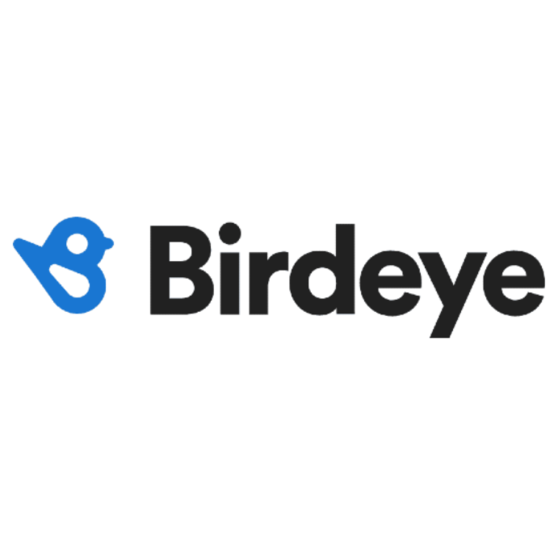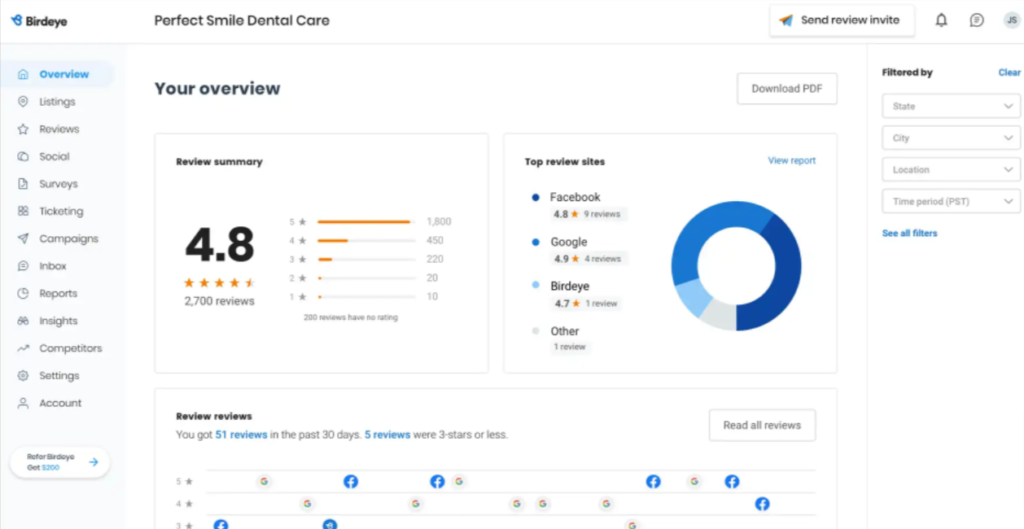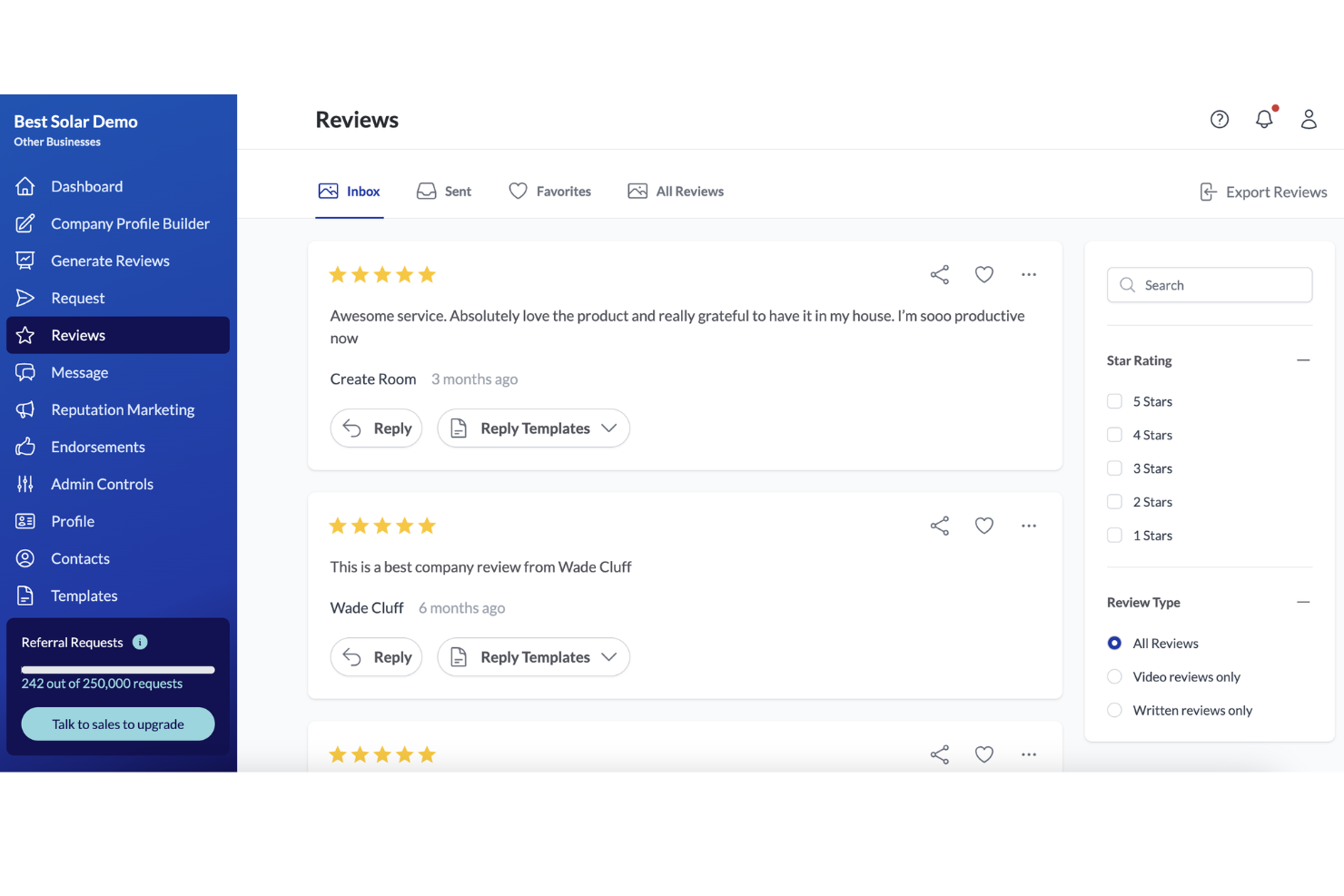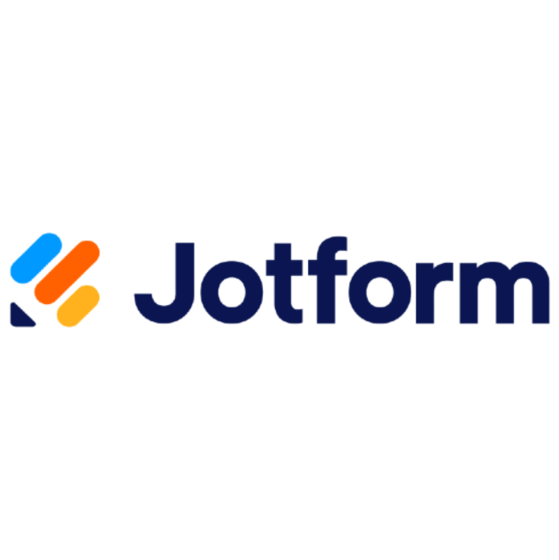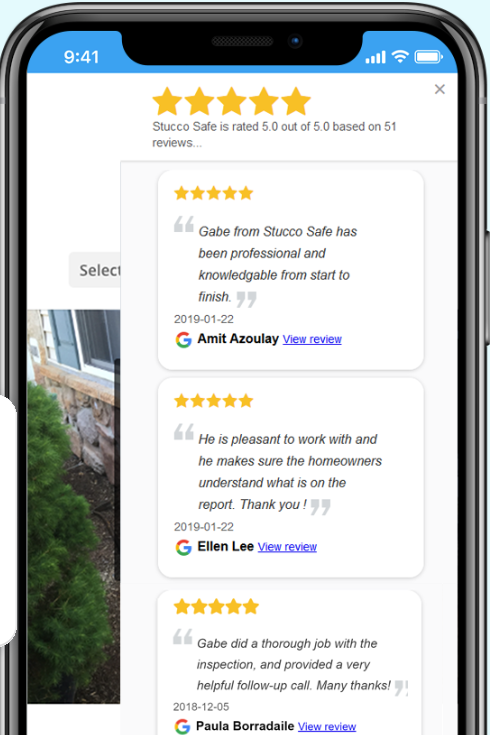10 Best Customer Review Management Software Shortlist
Here's my pick of the 10 best software from the 16 tools reviewed.
Our one-on-one guidance will help you find the perfect fit.
With so many different review management software solutions available, figuring out which is the right fit for you is tough. You know you want software to help you manage your customer reviews more efficiently, but you need to figure out which option is best. In this post, I'll help you make your choice easier by sharing my insights on the best review management software to monitor customer satisfaction and maintain your brand reputation across multiple platforms.
Why Trust Our Reviews
We’ve been testing review management software since 2021. As CX professionals ourselves, we know how critical and difficult it is to make the right decision when selecting software.
We invest in deep research to help our audience make better software purchasing decisions. We’ve tested more than 2,000 tools for different customer experience use cases and written over 1,000 comprehensive software reviews. Learn how we stay transparent & our software review methodology.
The Best Customer Review Management Software Solutions Summary Table
| Tools | Price | |
|---|---|---|
| Birdeye | From $299/month | Website |
| Snoball | From $499/month | Website |
| Jotform | From $39/user/month | Website |
| Brand24 | From $79/month (annually) | Website |
| ReviewTrackers | Pricing Upon Request | Website |
| Grade.us | From $54/user/month | Website |
| Podium | From $289/month | Website |
| Yotpo | From $9/month. | Website |
| Rize Reviews | Pricing Upon Request | Website |
| Gominga | Pricing Upon Request | Website |

Compare Software Specs Side by Side
Use our comparison chart to review and evaluate software specs side-by-side.
Compare SoftwareHow to Choose Review Management Software
Choosing the right review management software can help you collect, manage, and respond to customer reviews across multiple platforms.
As you're shortlisting, trialing, and selecting review management software consider the following:
- What problem are you trying to solve - Start by identifying the review management gap you're trying to fill to clarify the features and functionality the review management software needs to provide.
- Who will need to use it To evaluate cost and requirements, consider who'll be using the software and how many licenses you'll need. You'll need to evaluate if it'll just be the customer service team or the whole organization that will require access. When that's clear, it's worth considering if you're prioritizing ease of use for all, or speed for your review management software power users.
- What other tools it needs to work with Clarify what tools you're replacing, what tools are staying, and the tools you'll need to integrate with, such as accounting, CRM or HR software. You'll need to decide if the tools will need to integrate together, or alternatively, if you can replace multiple tools with one consolidated review management software.
- What outcomes are important - Consider the result that the software needs to deliver to be considered a success. Consider what capability you want to gain, or what you want to improve, and how you will be measuring success. For example, an outcome could be the ability to get greater visibility into performance. You could compare review management software features until you’re blue in the face but if you aren’t thinking about the outcomes you want to drive, you could be wasting a lot of valuable time.
- How it would work within your organization - Consider the software selection alongside your workflows and delivery methodology. Evaluate what's working well, and the areas that are causing issues that need to be addressed. Remember every business is different — don’t assume that because a tool is popular that it'll work in your organization.
Best Review Management Software Reviews
Here’s a brief description of each customer review management system to showcase each tool’s best use case, some noteworthy features, and screenshots to give a snapshot of the user interface.
Birdeye
Best AI-enabled review management software for local businesses
Birdeye is a customer experience platform designed to help you get more reviews automatically, then turn reviews into a competitive advantage. The software sends customers to top review sites to share their feedback.
Managers can access all reviews for every location, from every source, all in one dashboard.You can also create surveys to capture real-time feedback and understand your customers better.
Birdeye generates, manages, and amplifies online reviews across Google, BBB, Facebook, and over 200 other review sites. Direct integration with the Google API makes this option powerful for Google reviews.
This tool integrates with over 1000 apps, including Square, Zoho CRM, Infusionsoft, and Pipedrive.
Birdeye costs from $299/user/month. A free demo is available.
Snoball is a word-of-mouth marketing platform designed for B2B events, helping event organizers amplify their events without increasing their budgets by mobilizing attendees, sponsors, and speakers to become trusted event advocates.
I chose Snoball because of its strong reputation for automating word of mouth marketing. It distinguishes itself by generating referrals, creating marketing assets, and collecting reviews effortlessly. I believe Snoball is best for automating word of mouth marketing due to its comprehensive approach to leveraging satisfied customers for referrals and its ability to improve a brand's online reputation through increased positive reviews and enhanced customer sentiments.
Integrations include all major CRMs, such as Salesforce, HubSpot, and Zoho CRM, and they also offer an API.
Pricing starts at $499 per month, and they have a free plan available.
Jotform Enterprise is a cloud-based form automation platform that allows users to create, design, and publish various online forms across different channels and collect customer responses. The analytics and reporting features provide survey teams with actionable insights for generating leads, conducting market research, registering guests for events, managing job applications, and managing customer reviews.
The Card feature is a one-page-per-question survey format tailored to help users improve their survey response rates. The online survey platform offers a considerable selection of premade form templates that cover various applications, from online bookings and event registration to file upload and feedback templates. The feedback templates also cover many use cases, such as training sessions, appointment feedback, product reviews, and service reviews.
One of the core features is the easy-to-use form builder. Once you have chosen a pre-made survey template, you can use the form builder to customize the form to suit your requirements. The form builder has drag-and-drop functionality so modifying survey forms won’t require coding. You can set the form as a customer feedback survey to capture customer sentiment or reviews on a particular product or service.
In addition to the prebuilt templates designed for capturing customer reviews, Jotform Enterprise also provides many apps and integrations, including Slack, Mailchimp, Google Calendar, Microsft OneDrive, Airtable, Google Drive, PayPal, Stripe, and Square. The mobile forms module lets you collect meaningful data offline that they can conveniently manage using their smartphone or tablet. Additional features include encrypted forms, advanced security compliances, Single Sign-On (SSO), white labeling, multiple-user access, report generation, data analysis, and more.
Brand24 is a digital tool designed for social listening and media monitoring. It is primarily recognized for its accessible and actionable analytics that assist businesses in managing their online presence and engaging with influencers.
The tool assists businesses in managing their online reputation by monitoring and analyzing customer reviews from a multitude of sources, including social media platforms, review sites, blogs, forums, and more. It provides insights into customer sentiment and feedback, enabling companies to respond proactively to both positive and negative reviews.
The software also features AI-powered sentiment analysis, social listening, and an Anomaly Detector to help businesses understand and improve their brand image. Brand24 can additionally evaluate marketing efforts and benchmark against competitors by identifying the reach and importance of mentions.
Brand24 integrates with Slack, LinkedIn, Spotify, Telegram, Instagram, Facebook, Reddit, TikTok, YouTube, X (Twitter), and Tripadvisor.
Brand24 costs from $79/month. A 14-day free trial is available.
ReviewTrackers is a proven reputation and review management system, designed to drive acquisition and retention strategies. Core features include review collection, competitor tracking, media monitoring, and alerts.
The software also offers detailed performance analytics, review widgets, and review requests by SMS.The software offers actionable insights into how your brand compares with competitors in terms of review performance.
You can then leverage this information to gain an advantage and drive more revenue. Online reviews are collected from over 100 third-party platforms, including Google, Facebook, Yelp, and TripAdvisor.
This tool integrates with major business tools such as Google My Business, HootSuite, and BrandWatch.
ReviewTrackers offers customized pricing on request.
Grade.Us is a cloud-based reputation management platform that offers automation of review management. Features include feedback collection, multi-channel management, and gathering social proof.
Admins can also create drip marketing campaigns, which aim to acquire reviews over a period of time.They can also use the review reporting tools to track reviews recently published on social media platforms.
Managers can create customized campaign performance reports, monitoring metrics such as click-through and conversions. This platform is especially-suited to agencies who need to manage reputations for many clients.
This tool integrates with major business tools such as Google Sheets, Salesforce, Hubspot, and Google My Business.
Grade.us costs from $54/user/month, and a 14-day free trial is available.
Podium is a customer engagement platform focused on helping local businesses manage their online presence. This SaaS software includes easy-to-use tools that enhance the customer experience and help with local SEO.Online review generation is a core feature, with customers encouraged to offer feedback on products and services.
Podium also includes SMS marketing, webchat, and payment processing features. The system facilitates personalized text conversations and customizes review gathering campaigns.
This tool integrates tools such as Salesforce, Airtable, and Calendly.Podium costs from $289/user/month, and a 14-day free trial is available.
Yotpo is a popular content marketing platform for ecommerce businesses, designed to generate feedback and referrals. Using this platform, you can collect reviews using email and SMS channels.
Customers can use photos and videos to enrich their feedback and testimonials.You can display positive reviews on your website, showcase highlights, and show reviews to potential customers on your checkout page.
The reporting and analytics module gives detailed insight into customer sentiment, plus you can manage the impact of reviews on conversion rates.
This tool integrates with ecommerce platforms such as Shopify, Magento, BigCommerce, and WooCommerce.
Yotpo costs from $15/user/month, and a free trial is available.
Rize Reviews offers a reviews widget for displaying customer feedback, pulling in reviews and ratings from Google, Facebook, and the Better Business Bureau (BBB). You can choose your preferred widget display settings and select whether or not to show the aggregate review score.
Customers can share online reviews using any device. The widget is designed to provide easy access to users across multiple channels and platforms. The software offers a range of reputation management features.
These include flexible targeting, custom brand messaging, personalized email campaigns, and automatic review monitoring. This tool integrates with major business tools such as Salesforce, Zoho CRM, and LinkedIn.
Rize Reviews offers customized pricing on request. A free demo is available.
Gominga is a reputation management platform that helps organizations collect and respond to feedback in a single suite. Core features include customer experience management, review notification, and activity tracking.
The system also offers customizable templates and sentiment analysis.Admins can evaluate reviews, identify new opportunities and analyze the strengths or weaknesses of products.
Additional modules cover response, analytics, and sentiment analysis.This tool integrates with major customer support platforms such as ZenDesk.
Gominga offers customized pricing on request.
Other Review Management Software
Here are a few more review management solutions that didn’t make the top list.
- Merchant Centric
Best for collecting reviews with a single link
- Trustpilot Business
Best for real-time insights into consumer reviews
- Get More Reviews
All-in-one solution for gathering and sharing customer reviews
- Review Tool
a simple but effective way to invite readers to leave reviews
- GatherUp
Consolidates feedback and reviews into one place to increase sales
- Score My Reviews
a reputation management tool that integrates with all major review platforms
Related CX Software Reviews
If you still haven't found what you're looking for here, check out these related customer experience management tools that we've tested and evaluated.
- Customer Service Software
- Help Desk Software
- Call Center Software
- Customer Messaging Platform
- Digital Experience Platform
- Sentiment Analysis Tools
Selection Criteria for Review Management Software
Selecting review management software requires a careful assessment of its functionality and the ability to meet specific use cases that are crucial for effectively managing customer reviews, monitoring satisfaction, and maintaining brand reputation across multiple platforms.
Through extensive personal research and trial of these tools, I've developed a criteria system to evaluate software based on several key aspects. Here’s a summary:
Core review management software Functionality: 25% of total weighting score
Common features for review management software typically include gathering and showcasing reviews, search and monitoring capabilities, a single management dashboard, feedback management, real-time notifications, reporting & analytics, sentiment analysis, response templates, and multi-platform management. These features form the backbone of any effective review management system, enabling businesses to collect, analyze, and act on customer feedback comprehensively.
To be considered for inclusion on my list of the best review management software, the solution had to support the ability to fulfill common use cases:
- Efficiently gathering customer reviews from various platforms
- Providing detailed analytics and reporting on review data
- Facilitating swift and organized response to customer feedback
- Offering sentiment analysis to understand customer emotions
- Enabling review display on business websites or social media
Additional Standout Features: 25% of total weighting score
- Identifying unique features not offered by competitors, such as advanced AI for sentiment analysis or integrations with CRM systems.
- Tools that offer innovative approaches to gathering and displaying reviews, like interactive review widgets or VR feedback sessions.
- Assessing how tools enable businesses to engage with reviews in new ways, such as video responses or gamified feedback mechanisms.
Usability: 10% of total weighting score
- Interface design that balances power with simplicity, making advanced functionalities accessible to non-technical users.
- Interactive features like drag-and-drop elements for customizing review displays or setting up notification rules.
Onboarding: 10% of total weighting score
- The presence of comprehensive training materials, such as video tutorials and interactive product tours, to facilitate a smooth transition.
- Quick setup processes backed by resources like template libraries and automated workflow suggestions.
Customer Support: 10% of total weighting score
- Responsive support teams that offer multiple contact channels, including live chat and dedicated account managers.
- Extensive knowledge bases and community forums where users can find answers and share insights.
Value For Money: 10% of total weighting score
- Competitive pricing structures that offer clear benefits over alternatives, with flexible plans to suit different business sizes and needs.
- Considering the ROI that features like advanced analytics and multi-platform management bring to businesses.
Customer Reviews: 10% of total weighting score
- High ratings in user satisfaction and ease of use, indicating a positive overall user experience.
- Feedback that highlights the effectiveness of specific features, such as real-time alerts or integration capabilities, in improving review management workflows.
Through this detailed evaluation framework, I ensure that the selected review management software not only provides the core functionalities needed to manage online reviews but also offers unique features and superior usability, onboarding, customer support, and value for money.
Trends in Customer Review Management Software
As review management software evolves, there is a broader shift towards more integrated, intelligent, and user-centric approaches. Here's what the latest product updates, press releases, and release logs from leading tools reveal about current trends and demands in the sector.
- Unified Platforms for Multi-Channel Review Management: There's a clear trend towards solutions that offer comprehensive management of reviews across various platforms (social media, websites, third-party review sites) from a single dashboard. This functionality addresses the challenge of fragmented review landscapes, making it easier for businesses to maintain a cohesive online presence.
- AI Integration for Sentiment Analysis: The integration of artificial intelligence (AI) is pivotal, enhancing businesses' ability to track sentiment, detect fake reviews, and automate review management processes. This trend underscores the shift towards more sophisticated, automated systems that can provide deeper insights into customer feedback.
- Deep Listening and Reputation Technology: AI's role extends to deep listening and reputation management, enabling more effective monitoring of customer concerns. This advancement signifies a move from traditional customer experience metrics to a trust-based relationship model.
- Rise of Video Reviews and Visual Content: The anticipated increase in video reviews and visual content is setting a new standard for engaging customers and showcasing products or services more dynamically. This trend indicates a broader shift in consumer preferences towards richer, more engaging content formats.
- Focus on Review Quality and Relevance: There's a growing emphasis on ensuring reviews provide valuable insights and reflect genuine customer experiences, optimized for local search rankings and strategic analysis. This trend highlights the increasing importance of quality and relevance in reviews, beyond mere positivity or volume.
As these trends continue to unfold, they promise to offer customer experience professionals more powerful, efficient, and insightful means to manage reviews and build stronger, trust-based relationships with customers.
What is Review Management Software?
Review management software is a tool companies use to manage customer reviews online. They assist with collecting, monitoring, and responding to reviews across multiple digital platforms. Key features include a centralized dashboard, automatic alerts for new reviews, response management tools, and analytics to uncover trends and analyze customer sentiment.
Review management software is an important tool that helps companies maintain a positive brand reputation online and foster ongoing customer engagement. Companies can also use them to gather customer insights to make business improvements, giving them a competitive edge in the marketplace.
Features of Review Management Solutions
Managing the complexities of online customer reviews demands accuracy, vigilant oversight, and proactive engagement strategies to preserve and improve brand reputation. Effective review management software becomes an essential tool in this endeavor, facilitating the collection, analysis, and response to customer feedback across numerous platforms.
Here, I highlight the critical features that such software must offer to ensure a brand can not only monitor customer satisfaction but also strengthen its position in a fiercely competitive market.
- Review Gathering: Makes it easier for customers to leave reviews online. This feature is crucial as it ensures a continuous stream of feedback, allowing brands to consistently measure customer satisfaction.
- Review Showcase: Allows for the display of reviews on a company’s website. Showcasing positive customer experiences can significantly boost a brand's trustworthiness and attract prospective customers.
- Search and Monitoring Capabilities: Identifies reviews across social media and other platforms. This function enables brands to stay updated about their online reputation, ensuring all feedback is acknowledged.
- Single Management Dashboard: Provides a centralized interface for review management. Having a unified control point simplifies administrative tasks, making it more straightforward for teams to manage their online reputation effectively.
- Feedback Management: Enhances the processing of customer feedback. Timely and appropriate reactions to feedback show a brand's dedication to customer satisfaction, encouraging loyalty.
- Real-time Notifications: Alerts immediately for new reviews. This feature is key for brands to respond quickly to customer feedback, a critical aspect of maintaining a positive online presence.
- Reporting & Analytics: Delivers insights into review patterns and customer sentiment. Gaining an understanding of the underlying themes in customer feedback allows brands to make decisions that can improve customer satisfaction and loyalty.
- Sentiment Analysis: Evaluates the emotion and sentiment behind reviews. By grasping customer sentiment, brands can pinpoint areas needing improvement and highlight strengths, adjusting their strategies accordingly.
- Review Response Templates: Provides customizable templates for replying to reviews. Managing responses efficiently saves time and ensures consistent communication, casting the brand in a favorable light.
- Multi-Platform Management: Manages reviews across various platforms through one tool. This capability is essential for brands aiming to maintain a uniform reputation across the digital sphere.
Mastering customer feedback with precision requires sophisticated review management software endowed with these features. Such a tool not only simplifies the process of collecting and analyzing customer feedback but also enables brands to actively connect with their audience, boosting customer satisfaction and loyalty. With these functionalities at their disposal, companies can effectively protect their online reputation, ensuring their brand remains prominent in customers' minds.
Benefits of Review Management Software
Utilizing review management software can enable businesses to achieve an unparalleled level of efficiency and control in managing customer feedback, allowing them to concentrate more on strategic improvements and customer experience enhancement while minimizing manual oversight and maximizing overall reputation. Here are five primary advantages of utilizing review management software for your organization:
- Improved Operational Efficiency: Automates the process of collecting and organizing reviews. By reducing the manual effort required to manage customer feedback, businesses can allocate resources more efficiently and focus on strategic activities.
- Enhanced Customer Insights: Offers deep analytics and sentiment analysis. This software provides businesses with actionable insights into customer preferences and pain points, enabling them to tailor their products, services, and customer experiences more effectively.
- Increased Online Visibility and SEO: Improves search engine rankings through optimized review management. Regularly updated, authentic customer reviews enhance a business's online presence, making it more visible to potential customers searching for related products or services.
- Increased Trust and Credibility: Facilitates transparent and responsive interaction with customer feedback. Promptly addressing customer reviews, especially negative ones, can significantly improve a brand's credibility and foster trust among current and prospective customers.
- Higher Conversion Rates: Leverages positive reviews to attract and reassure potential customers. Showcasing positive feedback on a company's website or social media platforms can influence purchasing decisions, leading to increased sales and customer loyalty.
Whether you aim to boost your online reputation, gain deeper customer insights, or drive higher conversion rates, review management software is a pivotal tool for achieving these objectives, propelling your organization towards its strategic goals with greater ease and effectiveness.
Cost & Pricing for Review Management Software
When considering review management software, understanding the variety of plan options and their pricing structures is essential for making an informed decision. Pricing and plans can vary significantly, offering a range of features tailored to different business needs, from small startups to large enterprises. Here's a breakdown of the common plan options and their average pricing, including a free option for those just starting out.
| Plan Type | Average Price | Common Features |
|---|---|---|
| Free | $0 | Basic review aggregation, Limited reporting, Manual review responses |
| Basic | $50 - $100/month | Automated review requests, Multi-platform monitoring, Basic analytics, Email support |
| Professional | $100 - $250/month | Advanced analytics, Sentiment analysis, Integration with CRM systems, Priority email support |
| Enterprise | $250+/month | Customizable dashboards, API access, White-labeling options, Dedicated account manager, 24/7 support |
Choosing the right plan requires weighing your business's size, needs, and the specific features that will most benefit your review management strategy. The free plan is a good starting point for small businesses or those new to review management, while larger organizations or those needing advanced features should consider professional or enterprise options. Consider your budget and the value each plan brings to your customer engagement and reputation management efforts.
Review Management Software FAQs
Here are some answers to frequently asked questions on this topic:
How do I encourage customers to leave reviews?
Encouraging customers to leave reviews is all about creating an engaging, easy, and rewarding experience for them. A good start is simply to ask them directly via email or SMS after they’ve made a purchase or experienced your service. Make sure the process is as seamless as possible; a complicated process can deter customers from completing a review. Incentives like discounts on future purchases, entries into contests, or freebies can also motivate customers to share their feedback.
Can these tools filter out fake reviews?
Most likely. Many review management tools come equipped with algorithms and filters designed to identify and flag potential fake reviews. These tools look for patterns that are commonly associated with fake feedback, like unusual spikes in activity or reviews from accounts with little to no other activity. Some platforms also allow for manual flagging of suspicious reviews by business owners or their customers, offering a layer of human oversight.
Are there any compliance considerations with review management?
Absolutely. When managing online reviews, businesses must be aware of legal and platform-specific compliance issues. This includes ensuring that customer privacy is protected, especially under laws like the GDPR in Europe and various state laws in the U.S. Businesses should also be transparent about how they collect and use customer reviews, avoiding the manipulation of reviews to mislead consumers. This means not incentivizing positive reviews in a way that violates platform guidelines or legal standards for truth in advertising.
What are the costs of not managing online reviews?
Ignoring online reviews can be quite costly for businesses. It can lead to a poor online reputation, which directly impacts customer trust and, ultimately, sales. Negative reviews left unaddressed can give the impression that a business doesn't care about its customers or their experiences. Additionally, failing to engage with reviews means missing out on valuable feedback that could be used to improve products, services, and customer experiences.
What other types of software can improve customer experience?
If you're looking to delve deeper into enhancing customer experience and management beyond just review handling, explore these additional software categories:
- Customer Tracking Software
- Customer Success Software For CX Teams
- Customer Onboarding Software To Help Users Enter Your Ecosystem Smoothly
Why are Customer Reviews Important?
In today’s business world, consumers look for businesses they can trust. Reputation is everything, and reviews play an important role in commercial success. According to Search Engine Land, an amazing 88% of consumers trust product reviews as much as personal recommendations. A few five-star reviews make a big difference!
What Do You Think About This List?
That brings us to the end of this review of online reputation management software. Do you agree with my evaluations of the top tools? Let us know what you think in the comments below.
You can also sign up for our newsletter to stay up to date. We’ll bring the news and insights from the top thinkers in the customer experience world. You may also want to check out our article on customer experience software or find out what’s the best customer relationship management software today.
Finally, remember to come back often! We regularly publish articles to help you on your journey to a better customer experience.
Related Read: Optimizing The Website Customer Journey

